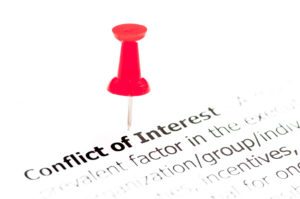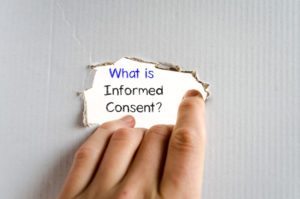Halloween is upon us. We put out the candy bowl and wait for the tiny ballerinas, ghosts, and football players to ring the doorbell and shout “trick or treat.” Despite the seemingly optional “or” language in the request, traditionally the kids will always get the treat.
Law firms also prefer “treats” in the form of new business. Yet sometimes firms are faced with the possibility that they may have to turn down new work because of a conflict of interest with a current or former firm client.
Some law firms try to avoid or limit their exposure to such situations by contracting with their clients to waive conflicts even before the facts giving rise to such conflicts are known either to the client or the law firm. Indeed, in large law firms that typically employ hundreds of lawyers in multiple offices around the globe, it is commonplace for their standard engagement agreements to include language in which the client agrees as part of the representation to waive in advance future conflicts of interest.
But are such “advanced waivers” ethical? It is one of the most vexing questions that has dogged law firms, regulators, and ethics counsel for years. The question raises two competing schools of thought.
On the one hand, the ethics rules require “informed consent” for a conflict waiver. The idea that a client can give an “advanced” waiver of a conflict is anathema to this fundamental requirement. How can a client be “informed” enough to give consent when they have no idea of the facts and circumstances giving rise to a conflict that has yet to arise? Some authorities consider advanced conflict waivers to be unenforceable and in violation of public policy.
The opposite school of thought treats advanced waivers based on freedom of contract principles. A client desires to hire a law firm. The client will do anything—including agreeing to an advanced waiver—as part of the price for retaining the firm’s services. The client is free not to accept the provision and hire a different law firm. But if they accept the advanced waiver, has not the client agreed to assume the risk of a future conflict? And if the client chooses to accept the advanced waiver, why shouldn’t the law firm be entitled to rely upon the client’s agreement?
For lawyers who want a clear, definitive, black and white answer to the question of the legality and enforceability of advanced conflict waivers, unfortunately there is none. Ethics opinions and court rulings have created a patchwork of opinions. This lack of uniform treatment of advanced conflict waiver leads to unpredictability—the type of “trick” that most lawyers would rather avoid.
Guessing incorrectly as to whether a court will uphold an advanced waiver may lead to unexpected, unfair, and even disastrous results for a law firm. The recent case of Sheppard, Mullin, Richter & Hampton, LLP v. J-M Manufacturing, 244 Cal.App.4th 590 (2016) demonstrates just how bad it can be for a law firm that takes on a new engagement in reliance on an advanced conflict waiver only to later have a court strike down the advanced waiver as against public policy and to order the law firm to disgorge millions of dollars in fees earned from the “conflicting” representation.
 Traditional Consent To A Conflict
Traditional Consent To A Conflict
Without an advanced waiver, a law firm seeking to take on a representation that is directly adverse to a current client, or that is substantially related to a representation of a former client, would have to do a delicate “dance” to obtain the consent of both affected clients.
Say a law firm has two clients. Its Brussels office is representing Company A in tax matters. Its New York office has been approached by Company B, which wants the Firm to sue Company A for patent infringement. The subject matter of the two representations are completely unrelated. Nonetheless, the Firm has a duty of loyalty to Company A, and that duty of loyalty prohibits the Firm from representing Company B adverse to Company A. The conflict of interest arises under ABA Model Rule 1.7(a) and its USPTO counterpart, 37 CFR Section 11.107(a). The only way the Firm may ethically undertake the new representation adverse to its existing client is to get the informed consent of both Company A and Company B, confirmed in writing.
Model Rule 1.0(e) defines “informed consent” as “the agreement by a person to a proposed course of conduct after the lawyer has communicated adequate information and explanation about the material risks of and reasonably available alternatives to the proposed course of conduct.” How does one get that consent? Carefully.
For starters, the fact that the firm has been approached by Company B is confidential to Company B. The firm simply cannot disclose that information to anyone it chooses without Company B’s consent. Thus, the first step in the two-party consent dance is for the law firm to ask Company B for permission to contact Company A and request the waiver. This request may be a non-starter. What if the element of surprise is important to Company B? There can be many reasons why Company B would not want to give a “heads up” to Company A that it is preparing to initiate litigation. If Company B for any reason refuses to permit the firm to contact Company A, then the issue is resolved—the firm must decline the representation of Company B.
Let us assume the firm clears the first hurdle and is permitted to contact Company A. What is Company A likely going to say in response? “Sure, no problem, even though we’ve entrusted you as our tax counsel and have paid your firm thousands of dollars over the years, go ahead and sue us.” Or are they more likely to say, “Are you kidding me—no way!” Indeed, the very fact that the firm has asked Company A for a conflict waiver may damage the relationship between the firm and Company A. If Company A declines the waiver request for any reason, then the issue is resolved—the firm must decline the representation of Company B.
Only if Company A and Company B consent after full disclosure of the advantages and disadvantages of agreeing to the waiver (in other words, the consent is “informed”), and that consent is confirmed in writing, then the firm has obtained a presumptively valid conflict waiver.
 Advanced Waivers – Consents to Future Conflicts
Advanced Waivers – Consents to Future Conflicts
The traditional waiver methodology takes a lot of work and the results are uncertain. Is there any easier way? Suppose Company A, at the start of the representation, entered into an engagement agreement with the Firm that included an “advanced conflict waiver.” A typical advance waiver might read something like this:
“Client agrees that, notwithstanding our law firm’s present representation of Client, we may, now or in the future, without seeking or obtaining your further consent, represent other persons, whether or not they are now clients of our law firm, in other matters, including litigation, where those other persons are adverse to Client. Client further agrees not to seek disqualification of our law firm should the firm sue Client in the future.”
The advance conflict waiver, at least on its face, preserves the law firm’s right to represent current or future clients in matters adverse to the interests of the prospective client, i.e., matters that would otherwise raise a conflict of interest for the firm. By signing an engagement letter containing such a provision, the client ostensibly waives its right to object to such future conflicts of interest.
Law firms like advanced waivers. Advance conflict waivers serve two major purposes for law firms. First, in theory they are an antidote to the reality that many law firms have multiple diverse practice groups and lawyers spread around the world, which gives rise to many potential conflicts. Prospective open-ended advanced waivers may protect the firm from the consequences of not recognizing an actual conflict when it arises. Furthermore, advance conflict waivers may improve a law firm’s bottom line by removing an obstacle to taking on new business the firm otherwise would not be able to take.
Is An Advanced Waiver Ethical And Enforceable? Yes. No. Maybe sometimes.
Will a Court or disciplinary authority uphold a broadly worded advanced conflict waiver? That is a question that has resulted in many conflicting analyses and, unfortunately, no clear guidance exists.
The ABA Model Rules include comments regarding “Consent to Future Conflict[s].” Comment 22 to ABA Model Rule 1.7 makes the point that the effectiveness of waivers of conflicts that may arise sometime in the future may well hinge on the extent that a client reasonably understands the potential consequences of the waiver. Consequently, the waiver’s effectiveness turns on such factors as the sophistication, prior experience and understanding of the client itself, and whether it is represented by other counsel (including, most obviously, in-house counsel) in giving the consent, as well as the adequacy of any explanation of the reasonably foreseeable types of future representations that could arise and the attendant risks.
In other words, an agreement in which a client provides a consent to a conflict type with which the client is previously familiar will routinely be considered effective, at least according to the Comment—which is not binding on any tribunal. On the other hand, the Comment states that an open-ended consent agreement that fails to adequately identify the types of conflict that later come into issue may not necessarily be effective, depending on the facts and circumstances
Terrific. Per the ABA comments, advanced waivers are effective. Unless they are not. It all depends “on the facts and circumstances.”
Opinions by governing ethics bodies routinely state that consents in advance are allowable or expressly supported by the relevant rules, but often such permission is not absolute. ABA Formal Opinion 05-436, for example, supports the validity and enforceability of an “open-ended” advanced waiver—provided that the clients entering into the agreement are experienced users of legal services and are “preferably” represented by independent counsel. This language is akin to the freedom of contract school of thought. Again, however, ABA Formal Opinions are not binding on any state or federal court or disciplinary tribunal, although it could be considered persuasive authority.
The New York City Bar Association Committee on Professional Ethics, in Formal Opinion 2006-1, concluded that advance consents are permissible, but advised attorneys to consider that the extent of necessary disclosure and the scope of a waiver may vary with the client’s level of sophistication. The opinion explained:
When a law firm agrees to represent a client in a particular matter, it may ethically request that the client waive future conflicts of interest, including that the client consent to allow the law firm to bring adverse litigation on behalf of another current client, if (a) the law firm appropriately discloses the implications, advantages, and risks involved and if the client can make an informed decision whether to consent; and (b) a disinterested lawyer would believe that the lawyer can competently represent the interests of all affected clients. See DR 5-105(C).
At least for a sophisticated client, blanket advance waivers and advance waivers that include substantially related matters (with adequate protection for client confidences and secrets) also are ethically permitted.
See also NYSBA Committee on Standards of Attorney Conduct, Proposed New York Rules of Professional Conduct Rule 1.7, Comment 22A (Sept. 30, 2005) (“A client may agree in advance to waive potential conflicts that have not yet ripened into actual conflicts. The nature of the disclosure necessary to ensure that the client’s advance consent is ‘informed’ will depend on various factors.”); Restatement 3d of Law Governing Lawyers § 122, Comment d (“[T]he gains to both lawyer and client from a system of advance consent to defined future conflicts might be substantial. A client might, for example, give informed consent in advance to types of conflicts that are familiar to the client.”).
The D.C. Ethics Committee similarly has expressly concluded in a formal opinion that “[a]dvance waivers of conflict are not prohibited by the [D.C.] Rules of Professional Conduct.” The D.C. formal opinion emphasizes providing clients with full disclosure of the nature and existence of possible conflicts and their consequences, such that a client can reach a fully informed decision. However, the D.C. Committee further notes that “[o]rdinarily this will require that either (1) the consent is specific as to types of potentially adverse representations and types of adverse clients . . . or (2) the waiving client has available in-house or other current counsel independent of the lawyer soliciting the waiver.” D.C. Legal Ethics Comm., Ethics Op. 309.
These opinions may raise more questions than they answer. Indeed, the D.C. Ethics Opinion 309 warns:
advance waivers have been struck down where they are unduly general and unsophisticated clients are involved. Correspondence with the objecting client’s nonlawyer employees (claims adjusters), for example, was held insufficient to constitute “consultation” or “full disclosure.” Florida Ins. Guaranty Ass’n, Inc. v. Carey Canada, Inc., 749 F. Supp. 255 (S.D. Fla. 1990); see Marketti v. Fitzsimmons, 373 F. Supp. 637 (W.D. Wisc. 1974) (where client a labor union local, mere knowledge of second representation insufficient to constitute waiver). Similarly, an open-ended release of the lawyer from “all rights, burdens, obligations, and privileges which appertain to his [former] employment,” coupled with consent for the lawyer to “engage his services pro and con, as he may see fit,” was held (notwithstanding the relative sophistication of the client) grossly insufficient to justify the lawyer’s subsequent activity—including disclosure of confidential information—adverse to the former client. In re Boone, 83 F. 944 (N.D. Calif. 1897). Instead, said the court, the release would be effective only if it were “positive, unequivocal, and inconsistent with any other interpretation.” Id. at 956. A more recent decision held that a general advance consent covering all unrelated matters is insufficient to waive adversity in litigation unless it expressly refers to “litigation.” Worldspan, L.P. v. Sabre Group Holdings, Inc., 5 F. Supp. 2d 1356 (N.D. Ga. 1998).
The requirement that the lawyer provide the client, in advance, with “full disclosure of the nature and existence of possible conflicts and their consequences” may be an impossibility or may be limited to a sub-category of potential conflicts—those that are foreseeable at the commencement of the engagement. Many conflicts, however, will not be known or foreseeable to the law firm at the start of the representation. And as discussed in the excellent article published in The Professional Lawyer (linked here), court decisions go both ways on the enforceability of an advanced conflict waiver.
In short, while there is a general trend by certain bars to permit advanced waivers in certain circumstances, not all regulators or authorities are uniform in their view of the legality of an advanced conflict waiver. And guessing the “wrong way” by trying to rely upon an advanced waiver that a court finds to be uneforceable may lead to disaster for a law firm. Tomorrow, we address the disaster scenario in the context of a recent case involving Sheppard Mullins now before the California Supreme Court.
Part 2 – The disaster scenario when the law firm guesses wrong

Well my mom is experiencing something g like this now in Housing court! No explanation! Just threw this conflict waiver and just sign it! NO we- rather she never spoke directly with him just people in said office then boom this? She’s disabled I try and help her with issues but I’m disadvantage by law???
Hi Sharon, this is not an uncommon situation for lawyers to seek conflict waivers. Such waivers are typically only valid if the client (your mom) has given enough information to inform her consent. The less sophisticated a client, the more explanation may be necessary as to the relative risks and benefits of such a waiver. Good luck with your situation.